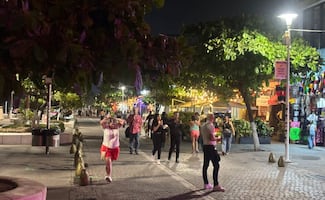Más Información

Turistas visitan Puerto Vallarta tras jornada violenta por operativo contra "El Mencho"; pasean si preocupación, afirman

Velocidad de fake news superan en 1000% esfuerzos de verificación, señala experta; terror digital también es una estrategia del narco

PVEM se deslinda de Pedro Segura Valladares tras amenazas a Loret; "no es ni ha sido militante del Partido Verde", asegura

Bajo fuerte dispositivo de seguridad, Diócesis de Apatzingán realiza procesión por la paz en Aguililla, Michoacán; es la cuna de "El Mencho"
For the visit of President Andrés Manuel López Obrador to Yucatán and Quintana Roo , Mayan organizations of the Yucatán Peninsula demanded the suspension of the “ colonizing project ” Mayan Train , as well as other constructions that deprive indigenous people of their lands and threaten their territories .
“We want to keep and enrich our culture and we demand the suspension of the colonizing project of a train that displaces and crushes us (…) we demand the suspension of the model of predatory tourism that trivializes and commercializes our indigenous dignity . We want to keep producing the Mayan fields and we demand the suspension of monoculture plantations that poison our land.
“We want to generate and distribute our own electricity and we demand the suspension of the private megaprojects of energies that deprive us of our territory. We want to raise our own animals and we demand the suspension of the megafarms of pigs that pollute our water,” reads the statement.
The stance comes from a meeting held last Thursday in Mérida, Yucatán , and is signed by the Assembly of Defenders of the Mayan Territory “Múuch Xíinbal ;” by the Mayan Beekeepers of Dzonot affected by fumigations in Tizimín, Yucatán ; by the Community Center U kúuchil kch’i’i’balo’on , of the municipality Felipe Carrillo Huerto , in Quintana Roo ; and by the Group of Mayan Communities of the Chenes , municipality of Hopelchén, Campeche .
Also, by the Group of Seeds Much’Kanan I’inaj and the Group K-luumil x’ko’olelo’ob , municipality of Bacalar, the Indigenous Council U’yóol lu’um , the Ejido Dziuche , and the Cooperative Society of U Lool , from the municipality of José María Morelos, Quintana Roo, in addition to the Cooperative Society of USAEC Beekeepers , municipality of Calakmul, Campeche, and U Yich Lu’um , municipality of Sanahcat, Yucatán.
In the statement, released on Monday by the Mexican Civil Council for Sustainable Forestry in the Yucatan Peninsula (CCMSS-PY) , the Mayan groups criticize the intervention of the government in the ejidos and indigenous communities, to divide them and confront them, around megaprojects that, they consider, are harmful for the communities, the natural resources, their identities and the property of their territories, threatening their unity, autonomy, and free will.
“The land is of the community, we neither sell it nor rent it . We say no to the division political parties and religions generate in our communities. We say yes to Mayan culture and language . Yes to the defense of our right to free will ,” they highlight in the statement spread on Saturday both in English and Spanish.
López Obrador
is in Yucatán as part of his tour in Mérida and Valladolid; on Tuesday he was on Tulum and Playa del Carmen ; on Monday , in Cancún , from where he will lead the morning conference.
A meeting between the President and the indigenous landowners was planned on Tuesday before the public act that was held at noon in the baseball field of the sports unit of that municipality.
In interview with EL UNIVERSAL , the president of the Indigenous Council U yóol lu’um , Luis Alberto Cahuich Salazar said that landowners from Bacalar and Tulum were convened to the meeting, looking for them to sign the transfer of rights of the lands where the Mayan Train will pass.
“We are already organized with groups from Yucatán, Campeche and Quintana Roo, and what we’ve been saying is that it’s not fair for them to ask us if we want a Mayan Train when we don’t even have thorough understanding of what the project is about.
“We also believe that this kind of megaprojects deforest greatly and attract massive tourist models that do not benefit us at all, but do harm us, since they are the reason for all the pollution we see in the sea, in the beaches, in the underground aquifers. So, we do not agree,” he highlighted
Referring to the statement, Cahuich Salazar coincides with the opinion that the government only brings with it “ promises of change ” and stories “that talk about a bright future,” of the arrival of development and benefits.
“The land of the Mayan communities in the Yucatán Peninsula is being, more than ever, offered and auctioned for the highest price; he who misleads our people and rapes and dismembers our territory to make his interests grow,” reads the statement, which mentions agribusiness , massive tourism , solar or wind megaprojects , and real estate developments , as megaprojects that intensify the dispossession and “devour life.”
The stance convenes Mayan communities to value and rescue what defines them, the wisdom of the grandparents, their tongue , their determination, and rebellion , as elements that have allowed them to survive and keep a culture around their fields and the coexistence with the Earth .
“We still have great expanses of jungle , cradle and nest of the water where the animals drink and the seeds germinate, homage to the great aquifer, its watery and cenotes . We still have our bees and our “jeles,” sacred nectar offered to mortals all around the world. We have our millenial wisdom about plants that heal and woods to build our houses.
“We have our rituals and ceremonies that pact each day our life with mother Earth and our coexistence with the animals of the jungle. We have our own ways of organizing, communication, of taking care of ourselves and thinking of us as a collective . We have a social tissue that keeps resisting the dispossession. We have our sacred sites that are an indelible mark of our origin (…),” is highlighted.
By calling to keep the fight for the defense of the territory and culture , the Mayan groups warned that they are not willing to lose their wealth, since it is not “tradeable currency.”
The statement is supported by the CCMSS , Articulación Yucatán , the Independent Cultural Center Pirate Galleon of Bacalar , the Resistance and Rebellion Network Jo’ , the Mexican Network of Rural Forestry Organizations (MOCAF) , Greenpeace-México , the National Center for Help to Indigenous Missions (CENAMI) , the group Autonomía-Saberes Locales , Indignation, Promotion and Defense of Human Rights , Grupo ETC , the Autonomous Arts and Culture Network of South Quintana Roo , and tens of citizens .
mp
Noticias según tus intereses
[Publicidad]
[Publicidad]













